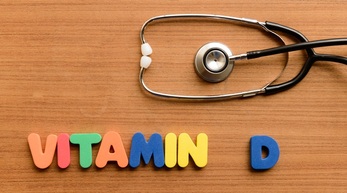Vitamin D reduces respiratory infections, but there's a catch

Lois A. Bowers, Senior Editor
11/2016
High doses of vitamin D reduce the incidence of acute respiratory illness by 40% in residents of assisted living communities and nursing homes, according to the results of a year-long clinical trial newly published by the Journal of the American Geriatrics Society.
The price for reducing one of the leading causes of serious illness, debilitation and death among senior living and long-term care residents, however, appears to be an increase in falls.
“Vitamin D can improve the immune system's ability to fight infections because it bolsters the first line of defense of the immune system,” explained the study's lead author, Adit Ginde, M.D., M.P.H., professor of emergency medicine at the University of Colorado School of Medicine. That bolstering of the immune system can prevent illnesses such as pneumonia, influenza and bronchitis, he added, and it also may prevent infections and exacerbations of chronic obstructive pulmonary disease, such as emphysema.
But Ginde and colleagues found an increase in falls among study participants who received higher doses of vitamin D, although the falls were lower in study participants who were given smaller doses rather than higher monthly doses of vitamin D.
The clinical trial studied 107 older adults (average age, 84) over 12 months. Two-thirds of the study participants were assisted living residents, Ginde told McKnight's Senior Living, and the rest were nursing home residents.
Fifty-five of the study participants received high doses of vitamin D (100,000 units monthly, averaging 3,300 to 4,300 units daily), and 52 received lower doses (averaging between 400 and 1,000 units daily). The rate of acute respiratory illness was cut almost in half among those who received the higher doses, but this group also had more than twice the incidence of falls.
More research is needed to confirm the effectiveness of high-dose vitamin D and whether high daily doses of the vitamin, rather than high monthly doses, decrease the likelihood that an older adult will fall, Ginde said. He added, however, that the study's primary finding that vitamin D can reduce acute respiratory illness is a major step forward in treating the infections.
“This is a potentially life-saving discovery,” Ginde said. “There is very little in a doctor's arsenal to battle acute respiratory illness, especially since most are viral infections, where antibiotics don't work.”
Assisted living communities and nursing homes can continue to reduce the likelihood of falls in residents, Ginde told McKnight's Senior Living, by improving resident strength and balance through physical therapy and other means, being aware of tripping hazards, improving lighting, using nonslip surfaces in areas where the risk of falls is high, helping to ensure that residents' vision is optimized, and reviewing medications and trying to reduce those that are associated with dizziness or falls.
Comment: There is a study attributing high levels of vitamin D with falls. However, one of the benefits of vitamin D is increased mobility. Someone laying in bed unable to move is not going to fall.
11/2016
High doses of vitamin D reduce the incidence of acute respiratory illness by 40% in residents of assisted living communities and nursing homes, according to the results of a year-long clinical trial newly published by the Journal of the American Geriatrics Society.
The price for reducing one of the leading causes of serious illness, debilitation and death among senior living and long-term care residents, however, appears to be an increase in falls.
“Vitamin D can improve the immune system's ability to fight infections because it bolsters the first line of defense of the immune system,” explained the study's lead author, Adit Ginde, M.D., M.P.H., professor of emergency medicine at the University of Colorado School of Medicine. That bolstering of the immune system can prevent illnesses such as pneumonia, influenza and bronchitis, he added, and it also may prevent infections and exacerbations of chronic obstructive pulmonary disease, such as emphysema.
But Ginde and colleagues found an increase in falls among study participants who received higher doses of vitamin D, although the falls were lower in study participants who were given smaller doses rather than higher monthly doses of vitamin D.
The clinical trial studied 107 older adults (average age, 84) over 12 months. Two-thirds of the study participants were assisted living residents, Ginde told McKnight's Senior Living, and the rest were nursing home residents.
Fifty-five of the study participants received high doses of vitamin D (100,000 units monthly, averaging 3,300 to 4,300 units daily), and 52 received lower doses (averaging between 400 and 1,000 units daily). The rate of acute respiratory illness was cut almost in half among those who received the higher doses, but this group also had more than twice the incidence of falls.
More research is needed to confirm the effectiveness of high-dose vitamin D and whether high daily doses of the vitamin, rather than high monthly doses, decrease the likelihood that an older adult will fall, Ginde said. He added, however, that the study's primary finding that vitamin D can reduce acute respiratory illness is a major step forward in treating the infections.
“This is a potentially life-saving discovery,” Ginde said. “There is very little in a doctor's arsenal to battle acute respiratory illness, especially since most are viral infections, where antibiotics don't work.”
Assisted living communities and nursing homes can continue to reduce the likelihood of falls in residents, Ginde told McKnight's Senior Living, by improving resident strength and balance through physical therapy and other means, being aware of tripping hazards, improving lighting, using nonslip surfaces in areas where the risk of falls is high, helping to ensure that residents' vision is optimized, and reviewing medications and trying to reduce those that are associated with dizziness or falls.
Comment: There is a study attributing high levels of vitamin D with falls. However, one of the benefits of vitamin D is increased mobility. Someone laying in bed unable to move is not going to fall.
